Their legs may be short, but Pembroke Welsh Corgis have left a towering impression! Beloved by Queen Elizabeth II, these charismatic canines have a royal connection spanning decades. But there’s more to their story than being furry companions to the British monarchy. Delve into Corgi folklore, where elves and fairies once rode them as trusty steeds. Learn how their stout build served them well as herding dogs in the pastures of Wales.
Discover what gives them their fox-like features and disproportionate silhouette. We’ll also explore their endearing personality, grooming needs, and activity requirements. Ready to embark on an exciting adventure into the captivating world of Pembroke Welsh Corgis? Let’s begin!
Table of Contents
- 1 History and Royal Connections of Corgis
- 2 Physical Characteristics and Weather Tolerance
- 3 Corgi’s Personality, Temperament, and Compatibility
- 4 Training and Grooming Needs of Corgis
- 5 Diet, Nutrition, and Health Considerations
- 6 Wrapping It Up
- 7 Related posts:
- 8 Corgi Puppy Guide: Breed Info & Tips
- 9 Cardigan Welsh Corgi: Breed Info & Facts
- 10 Understanding the Temperament of Pembroke Welsh Corgi Breed
History and Royal Connections of Corgis
Queen’s Furry Companions
Pembroke Welsh Corgis have long connected with the United Kingdom’s royal family. Queen Elizabeth II favored the breed since her childhood. Her first Corgi, named Dookie, sparked a lifelong love for these short-legged companions.
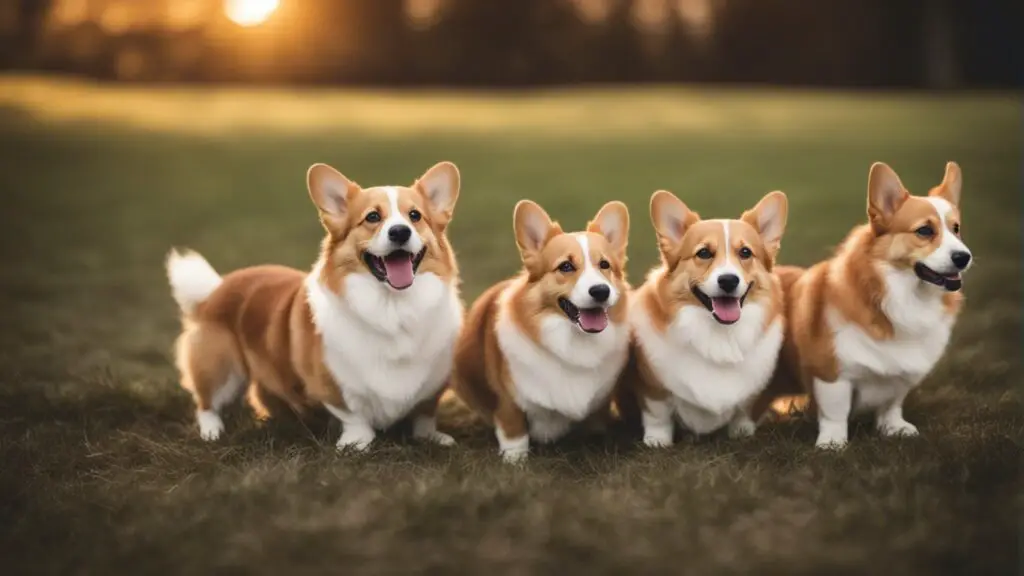
- Queen Elizabeth II has owned over 30 corgis during her reign.
- The last of her original line of corgis passed away in 2018.
Fairy Steeds in Welsh Folklore
Corgis aren’t just tied to royalty and deeply rooted in Welsh folklore. Legends say these dogs were used as steeds by fairies and elves. Their distinct markings are believed to be left by fairy harnesses and saddles.
- Some folk tales suggest that corgis would guide the fairies’ cattle.
- Others believe seeing a corgi was a sign of good fortune.
Historical Herding Dogs
Despite their small size, Pembroke Welsh Corgis were historically used for herding cattle. Their low stature allowed them to nip at the cows’ heels while avoiding kicks.
- They’re known for their intelligence and agility.
- These traits made them excellent working dogs on farms across Wales.
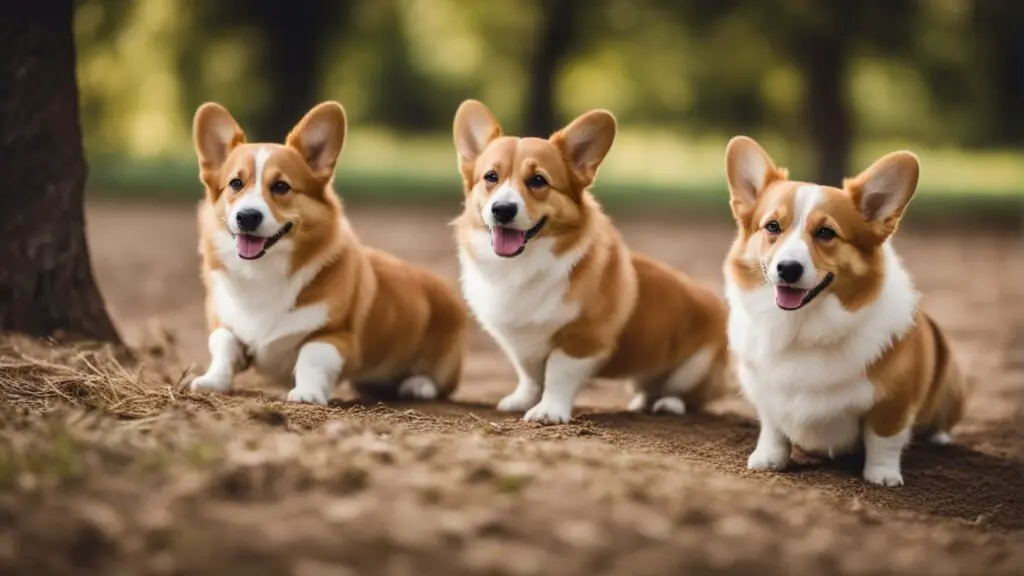
Physical Characteristics and Weather Tolerance
Short Legs, Long Body, Erect Ears
The Pembroke Welsh Corgi is a breed with unique physical characteristics. Their short legs and long body create an adorable yet sturdy silhouette. The erect ears add to their alert behavior, always ready for activity at any time.
Double Coat for Cold Climates
Part of the Corgi’s charm is its double coat. This isn’t just for show – it serves a practical purpose, too. The double coat provides excellent insulation against cold climates, making them easy to care for during winter.
- Inner Coat: Soft and dense, trapping heat close to the body.
- Outer Coat: Coarser and longer than the inner layer, repelling water and snow.
Average Weight
Pembroke Welsh Corgis typically weigh between 24-30 pounds on average. Despite their small stature due to their short legs, they have a robust build that contributes to this weight range.
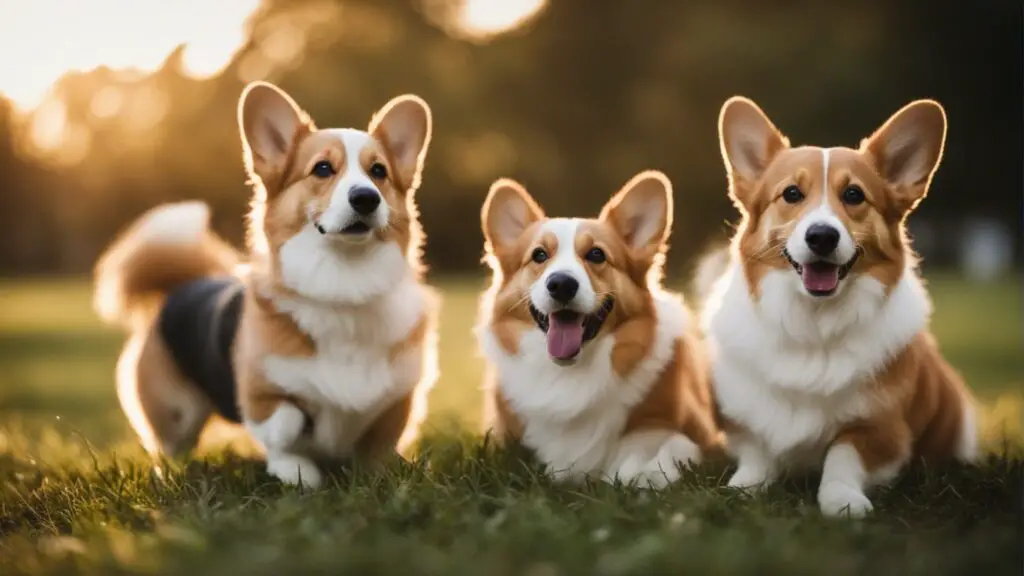
White Markings
In addition to their characteristic reddish-brown coat color, these corgis often sport white markings, which further enhance their appeal. These markings are usually found on parts of their body like:
- Muzzle
- Chest
- Legs
- Underparts
With these traits in mind, it’s easy to see why Pembroke Welsh Corgis capture hearts wherever they go! Their distinctive looks and high activity levels make them an engaging part of any household.
Corgi’s Personality, Temperament, and Compatibility
Pembroke Welsh Corgis are characteristic dogs. They’re known for being intelligent and playful. You’ll often find them figuring out puzzles or playing fetch in the park. Their smarts come with a dash of cheekiness, making them entertaining pets.
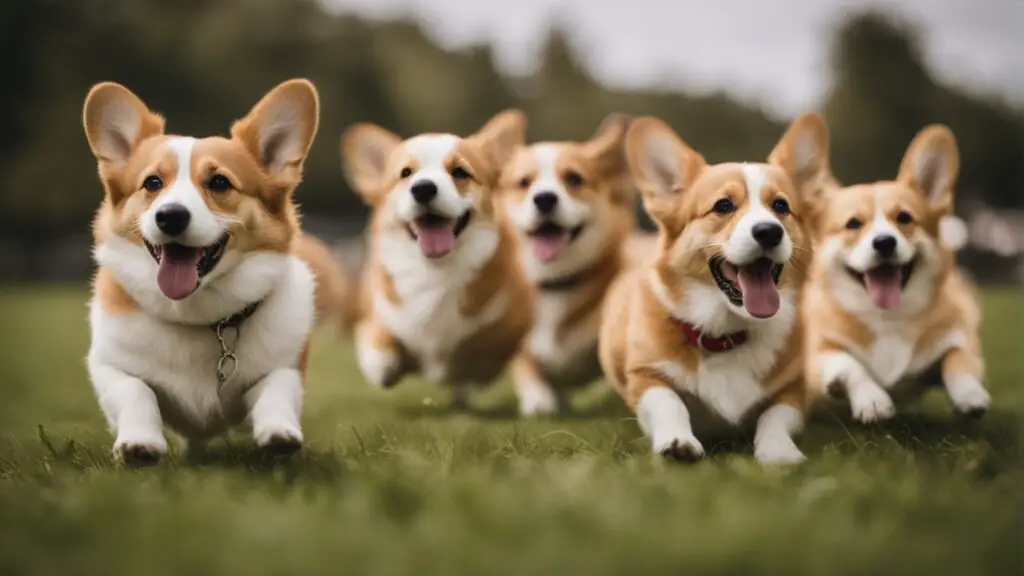
Good With Kids, Wary of Strangers
Despite their small size, this dog breed has a big heart. They’re great with children, always ready to join in games or offer comfort when needed. However, they can be wary around strangers. It’s not that they don’t like new people; they need some time to warm up.
Energy Levels
Corgis have high energy levels that require regular exercise. A bored Corgi is a destructive Corgi! Regular walks and playtime are essential to keep their minds and bodies healthy.
- Fetch
- Tug-of-war
- Agility training
These are some activities you might want to consider for your pet Corgi.
Training and Grooming Needs of Corgis
Consistent Training
Pembroke Welsh Corgis, known as herding dogs, are stubborn. This breed standard requires consistent training from the puppy stage. They’re not just family pets but separate breeds with herding instincts to herd cattle. So, don’t be surprised if your Corgi starts barking or attempting to herd you!
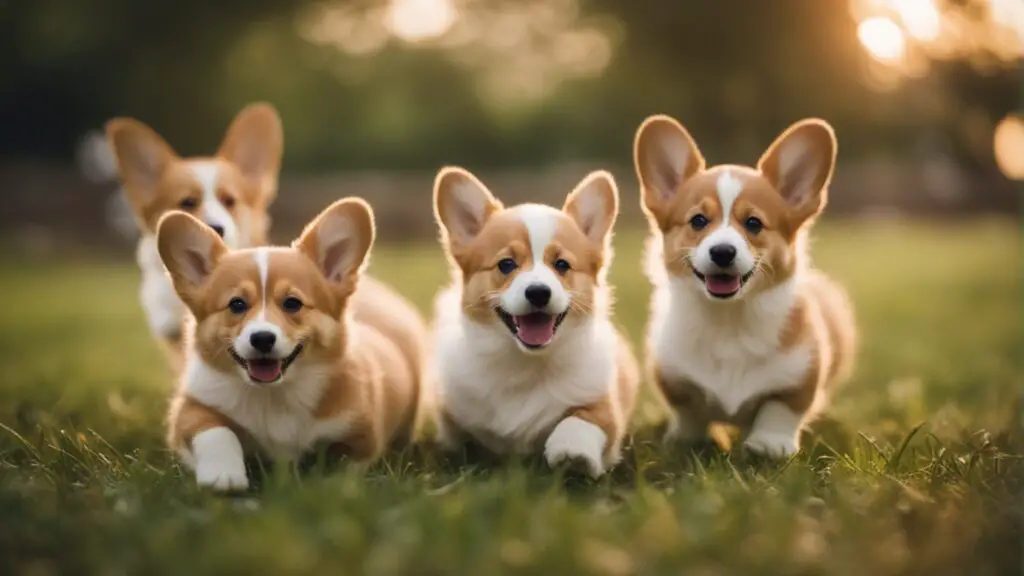
- Start early.
- Be consistent.
- Use dog treats as rewards.
Regular Brushing
Corgis have a knack for shedding! Dog care information suggests regular brushing is necessary for this breed due to their heavy shedding nature.
- Daily brushing
- Weekly baths
- Frequent checks for fleas or ticks
Diet and Exercise
These dogs are prone to obesity due to their love for dog food and less active lifestyle than other breeds recognized by the kennel club. Here’s what you need:
- Controlled diet: Measure meals and limit treats.
- Regular exercise: Walks, fetch games, let them use their herding instincts.
Remember these points when considering Pembroke Welsh Corgis as your next pet!

Diet, Nutrition, and Health Considerations
Genetic Conditions
Pembroke Welsh Corgis are prone to certain genetic health conditions. Hip dysplasia is a common issue among them. For this reason, health clearances for the parents of the Corgi are essential.
Balanced Diet
A balanced diet can help manage these issues:
- High-quality protein food
- Fiber-rich food
Protein helps in building solid muscles, while fiber aids digestion. This diet also maintains their energy levels for enough exercise and activities with their human family.
Regular Vet Check-ups
Regular vet check-ups are necessary for optimal health. They help detect potential health problems related to blood, skin, or weight early.
Remember, vet information is crucial in caring for your Corgi’s life.

Exercise Requirements
Corgis require enough exercise to maintain an ideal weight and stay healthy. Engaging them in activities with people or other pets can be beneficial.
Wrapping It Up
From fairy steed to royal confidant, the Pembroke Welsh Corgi has worn many crowns. Their journey reveals a breed of intelligence, adaptability, and charm. Those short legs come at the cost of potential health issues, but proper care and diet can help. Shower them with training, activity, and love, and they’ll reward you with fun and loyalty. No wonder Queen Elizabeth II favored these lively pups for decades! With their foxy features and infectious spirit, Pembroke Welsh Corgis are truly fit for a kingdom.
Frequently Asked Questions
Do Pembroke Welsh Corgis shed a lot?
Pembroke Welsh Corgis shed quite heavily due to their thick double coat. Regular brushing can help manage shedding.
Are Corgis good with children?
Absolutely! Corgis are known for being great with kids due to their friendly and protective nature.
How long do Pembroke Welsh Corgis live?
The average lifespan of a healthy Pembroke Welsh Corgi is around 12-15 years.
Can I keep a corgi in an apartment?
Yes, but remember that they are active dogs who need regular exercise. If you can provide this, an apartment life should be exemplary.
What health issues are common in Pembroke Welsh Corgis?
Corgis may be prone to genetic conditions such as hip dysplasia and eye problems. Regular vet check-ups can help detect any potential issues early.